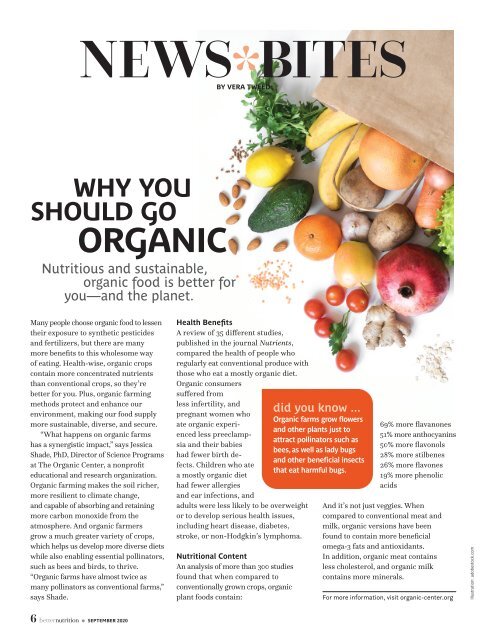You also want an ePaper? Increase the reach of your titles
YUMPU automatically turns print PDFs into web optimized ePapers that Google loves.
NEWS*BITES<br />
BY VERA TWEED<br />
WHY YOU<br />
SHOULD GO<br />
ORGANIC<br />
Nutritious and sustainable,<br />
organic food is better for<br />
you—and the planet.<br />
Many people choose organic food to lessen<br />
their exposure to synthetic pesticides<br />
and fertilizers, but there are many<br />
more benefits to this wholesome way<br />
of eating. Health-wise, organic crops<br />
contain more concentrated nutrients<br />
than conventional crops, so they’re<br />
better for you. Plus, organic farming<br />
methods protect and enhance our<br />
environment, making our food supply<br />
more sustainable, diverse, and secure.<br />
“What happens on organic farms<br />
has a synergistic impact,” says Jessica<br />
Shade, PhD, Director of Science Programs<br />
at The Organic Center, a nonprofit<br />
educational and research organization.<br />
Organic farming makes the soil richer,<br />
more resilient to climate change,<br />
and capable of absorbing and retaining<br />
more carbon monoxide from the<br />
atmosphere. And organic farmers<br />
grow a much greater variety of crops,<br />
which helps us develop more diverse diets<br />
while also enabling essential pollinators,<br />
such as bees and birds, to thrive.<br />
“Organic farms have almost twice as<br />
many pollinators as conventional farms,”<br />
says Shade.<br />
Health Benefits<br />
A review of 35 different studies,<br />
published in the journal Nutrients,<br />
compared the health of people who<br />
regularly eat conventional produce with<br />
those who eat a mostly organic diet.<br />
Organic consumers<br />
suffered from<br />
less infertility, and<br />
pregnant women who<br />
ate organic experienced<br />
less preeclampsia<br />
and their babies<br />
had fewer birth defects.<br />
Children who ate<br />
a mostly organic diet<br />
had fewer allergies<br />
and ear infections, and<br />
adults were less likely to be overweight<br />
or to develop serious health issues,<br />
including heart disease, diabetes,<br />
stroke, or non-Hodgkin’s lymphoma.<br />
<strong>Nutrition</strong>al Content<br />
An analysis of more than 300 studies<br />
found that when compared to<br />
conventionally grown crops, organic<br />
plant foods contain:<br />
did you know ...<br />
Organic farms grow flowers<br />
and other plants just to<br />
attract pollinators such as<br />
bees, as well as lady bugs<br />
and other beneficial insects<br />
that eat harmful bugs.<br />
69% more flavanones<br />
51% more anthocyanins<br />
50% more flavonols<br />
28% more stilbenes<br />
26% more flavones<br />
19% more phenolic<br />
acids<br />
And it’s not just veggies. When<br />
compared to conventional meat and<br />
milk, organic versions have been<br />
found to contain more beneficial<br />
omega-3 fats and antioxidants.<br />
In addition, organic meat contains<br />
less cholesterol, and organic milk<br />
contains more minerals.<br />
For more information, visit organic-center.org<br />
Illustration: adobestock.com<br />
6 • SEPTEMBER 2020

















